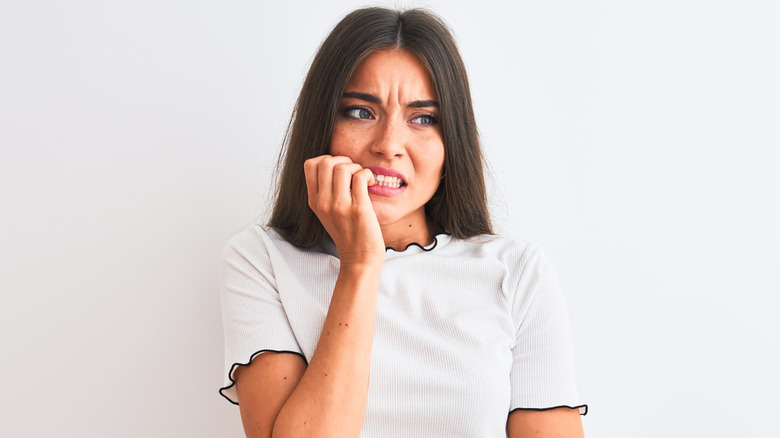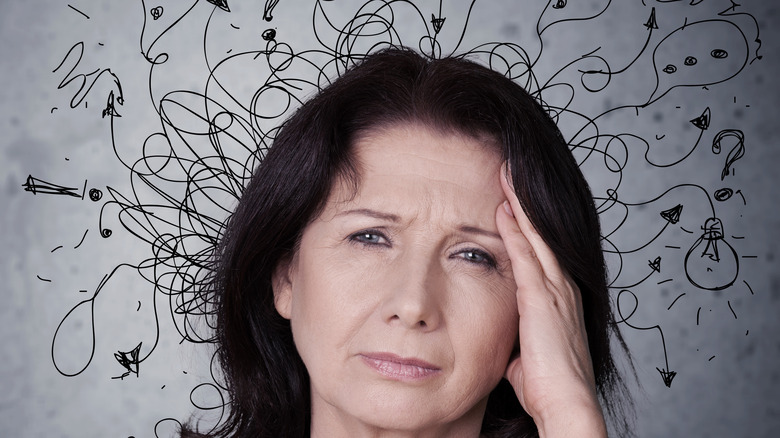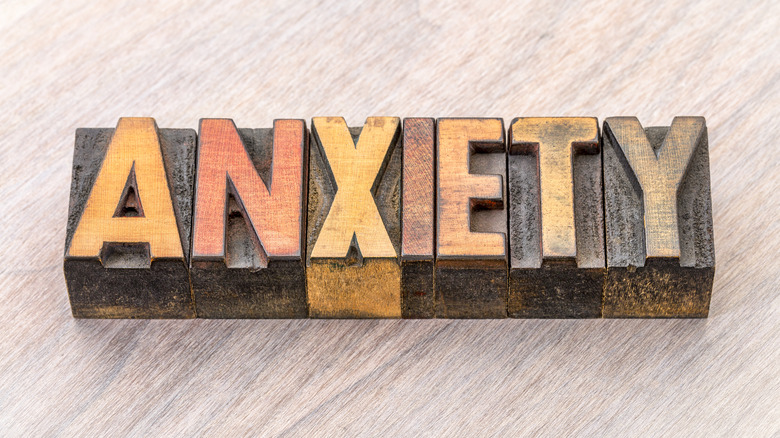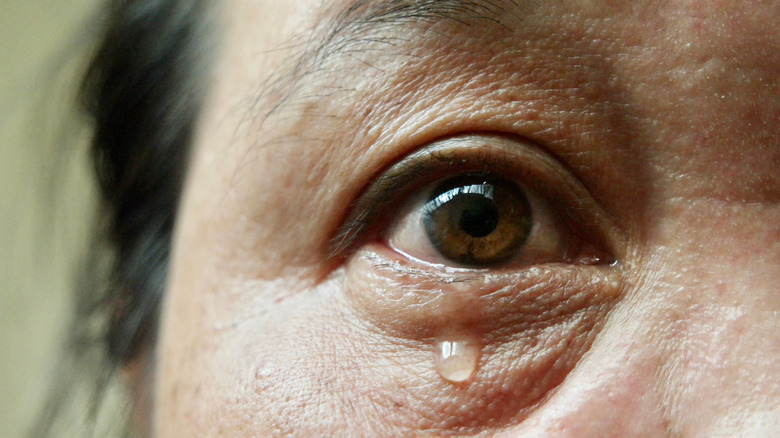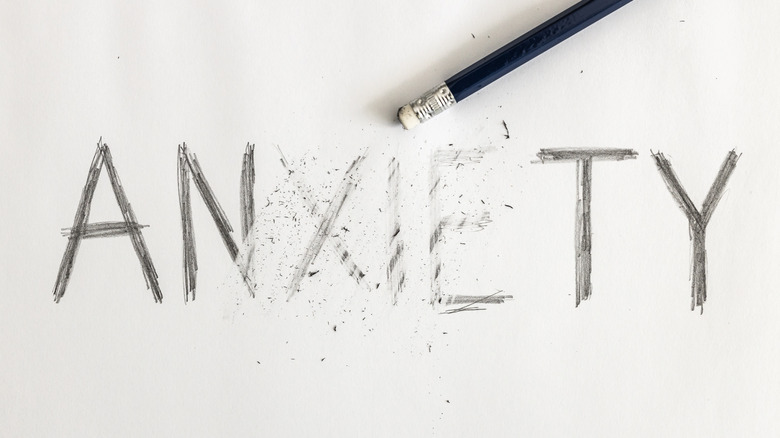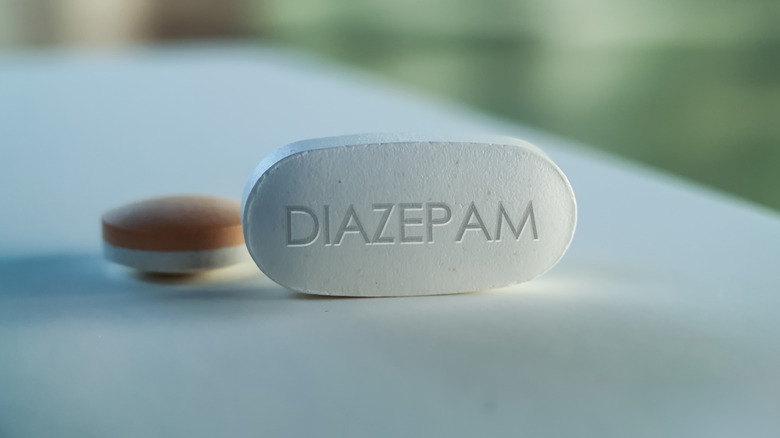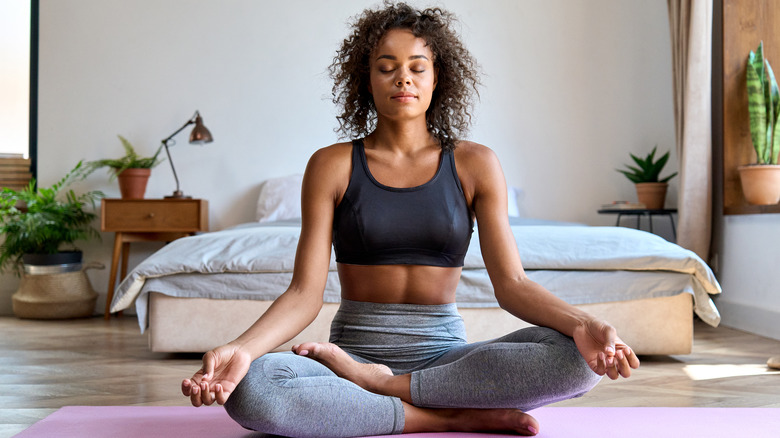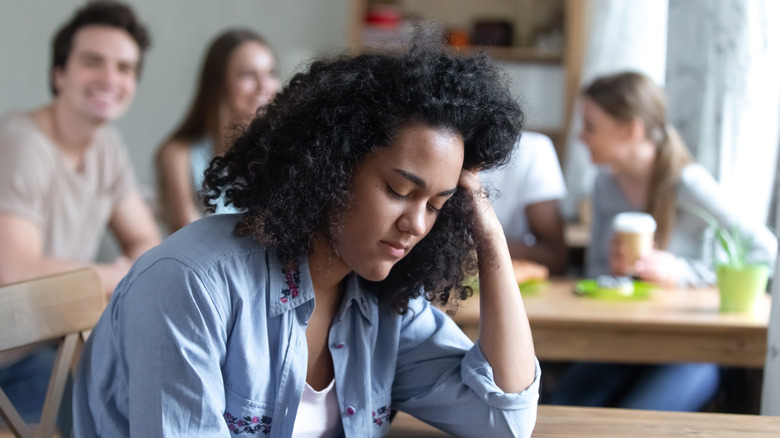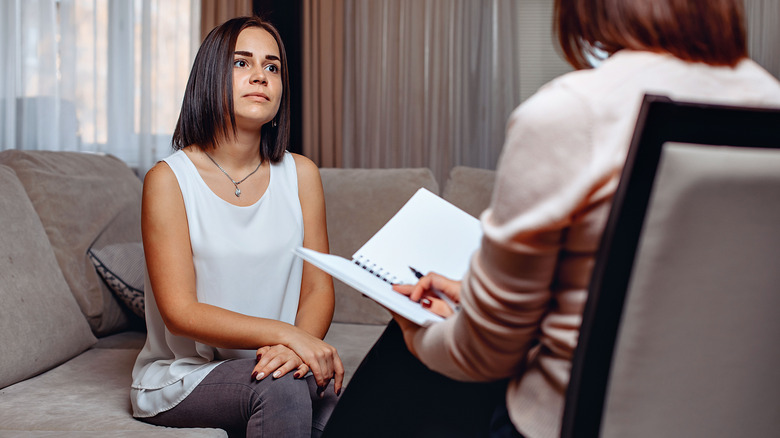Anxiety Explained: Causes, Symptoms, And Treatments
Experiencing anxiety occasionally is normal, because it is part of your body's defense system (via Harvard Health Publishing). Any time your brain perceives you are in danger, real or not, your brain will engage your "fight-or-flight" system. Anxiety is part of your body's response to natural threats.
However, in some cases, anxious feelings are persistent, even when there's no actual danger or trigger present. If anxiety becomes a normal part of your daily life, you may have an anxiety disorder — and if so, you're not alone. According to the National Alliance on Mental Illness (NAMI), anxiety disorders are the most prevalent mental health disorder in the U.S., affecting about 40 million American adults. Per survey data from Harvard Medical School, women are more likely to be affected than men.
Temporary anxiety can be a normal reaction to stressors of daily life, such as moving, divorce, or even a big positive change, such as a promotion at work. Temporary anxiety can help you cope, especially in the heat of a situation. However, you may have an anxiety disorder when you are overwhelmed by the dread, fear, and emotional and physical discomfort of persistent anxiety.
If you or someone you know is struggling with mental health, please contact the Crisis Text Line by texting HOME to 741741, call the National Alliance on Mental Illness helpline at 1-800-950-NAMI (6264), or visit the National Institute of Mental Health website.
Is this worry or anxiety?
The terms worry and anxiety tend to be used interchangeably; however, they have crucial psychological differences, according to Psychology Today. Worry is typically specific and focused. This feeling manifests in response to a particular concern, such as, say, an upcoming performance review at work. But because of this specificity, worry tends to be short-term (it stops as soon as the issue causing worry is over), causes less emotional upheaval, and can lead you to seek solutions to whatever is troubling you.
In contrast, anxiety is more generalized — it's not related to a specific event or problem — and it's also more severe. It creates a stronger state of emotional distress than worry, and can even cause physical and mental incapacitation. And because it's not tried to a particular issue, anxiety doesn't lead a sufferer to problem-solve; rather, they're more likely to stew in the upset feelings, as there's nothing to fix. Most important to keep in mind is that while worry is a normal psychological state, anxiety is not — it is a medical condition that requires treatment.
Types of anxiety disorders
Anxiety disorders are characterized by anxiety that persists, and may worsen as time goes on (via MedlinePlus). Under this umbrella, there are several different types of anxiety disorders. The most common is generalized anxiety disorder (GAD), which according to the Anxiety & Depression Society of America (ADAA) affects approximately 6.8 million adults and is frequently diagnosed alongside major depression. GAD is defined as excessive anxiety that lasts for at least six months (via The New England Journal of Medicine).
Panic disorder, much as its name implies, causes panic attacks, which are acute feelings of fear or terror that come on suddenly, even at times when there's no actual danger (per National Institute of Mental Health). These panic attacks can have distinctive physical symptoms, including heart palpitations or chest pain that can feel similar to a heart attack. A phobia is another type of anxiety disorder, characterized by fear or dislike of a particular thing (i.e. insects) or situation (like getting an injection or flying). Someone with a phobia will have feelings that are disproportionately intense, and which may cause the sufferer to restructure their days and lives to avoid the trigger.
Other anxiety disorders include agoraphobia, obsessive-compulsive disorder (OCD), separation anxiety disorder, selective mutism, and post-traumatic stress disorder, per Healthline.
Causes of anxiety disorders and risk factors
There is no known cause of anxiety; however, there is some evidence that heredity may play a role (via Dialogues in Clinical Neuroscience). Besides genetics, your environment, brain chemistry, major life events, and stress load are all suspected causes of anxiety disorders (via WebMD). Given this, people at particular risk for developing an anxiety disorder include those who've been through traumatic events (such as abuse, familial loss, or exposure to violence), have chronic or severe medical problems, have a personal or family history of other mental health problems, struggle with substance abuse, or have low self-esteem. Anxiety disorders are seen more frequently in women than in men, which may suggest that hormones and/or sociological factors are also at play (via Cleveland Clinic). Certain medications — including some used to treat asthma, ADHD, and migraines — might also lead to anxiety, or cause symptoms similar to anxiety (via Healthline).
Signs and symptoms of anxiety
The defining symptom of an anxiety disorder is, of course, persistent and out-of-proportion feelings of worry (via WebMD). But a variety of other symptoms may manifest depending on what kind of anxiety you have, and they can affect the body, mind/emotions, and behavior.
Some physical symptoms can include insomnia, trembling, hyperventilation, palpitations, mouth dryness, nausea, muscular tension, GI discomfort, sweating, and fatigue (via WebMD and Mayo Clinic). Those with anxiety may also find themselves feeling panicked, restless and unable to quiet the body and mind, engaging in repetitious or ritualistic actions, unable to focus on anything but their trigger, and also unable to stop thinking about the source of their distress (via Healthline). Nightmares and flashbacks to past negative events may also occur (via Cleveland Clinic). In their day-to-day life, someone with anxiety may actively try to avoid locations or things that trigger their fears, even to a compulsive degree (via WebMD).
Diagnosing anxiety disorders
If you suspect you have an anxiety disorder, your medical team may go through a few steps on the way to a diagnosis. First, your doctor will likely perform an exam, take a medical history, and possibly perform blood or urine analysis to rule out other health conditions that can cause similar symptoms as anxiety (via Mayo Clinic). If no other underlying cause of the symptoms is found, your physician may refer you to a psychiatrist, who can perform a full psychological evaluation and cross-check your symptoms with the APA's Diagnostic and Statistical Manual of Mental Disorders (DSM-5), according to the Mayo Clinic. After you receive a diagnosis, your doctor will recommend a course of treatment that may include psychotherapy, prescription medication, or a combination of both, potentially in addition to complementary and alternative treatments (via American Family Physician). Due to the highly individualized way that people experience anxiety, it may take some time to find just the right treatment for you.
Psychotherapy and cognitive behavioral therapy for anxiety disorders
Psychotherapy is also often called "talk therapy" because the patient has conversations with a trained therapist to gain insight into their feelings and to learn strategies to better cope with their symptoms (via National Alliance on Mental Illness). These sessions are conducted in a safe, private environment — or can even be conducted by phone or online via telehealth — and are always confidential. Psychotherapy is effective in treating many mental health conditions, including anxiety. A combination of medicine and psychotherapy is often your doctor's first strategy for treating an anxiety disorder.
Cognitive behavioral therapy (CBT) is a form of psychotherapy that has been shown to be effective in treating anxiety disorders. In CBT, you will examine your thought and behavioral patterns to determine if they are unproductive to your wellbeing (i.e. to determine if you're possibly engaging in outsized or distorted thinking). Your therapist will work with you to develop more realistic and productive thought patterns and coping mechanisms, with the ultimate goal of changing how you react to what causes your fear and anxiety. Many studies show CBT to be as effective or even more effective than certain medications and other psychotherapy practices.
For phobias or social anxiety disorders, a type of CBT called exposure therapy is often prescribed. Exposure therapy involves gradually exposing people to what they fear, with the goal of desensitizing them over time.
Medications to treat anxiety disorders
Depending on the type and severity of your anxiety, your doctor may prescribe medication to help you manage your symptoms. Several different medications are commonly used to treat anxiety disorders (via WebMD). Antidepressants work by affecting neurotransmitters (chemical messengers) in your brain, and take several weeks to become effective. You may need to try several before finding the right one. Side effects vary, but can taper off. A short-term anxiety medication also may be prescribed in conjunction for situational anxiety (such as a panic attack or social anxiety). Benzodiazepines are a class of sedatives that help relax your muscles and calm you. They are typically used short-term because they can be habit-forming, and can cause drowsiness, confusion, and affect memory and balance. Common examples include alprazolam (Xanax), clonazepam (Klonopin), diazepam (Valium), and lorazepam (Ativan). Buspirone (Buspar) is used to treat both short- and long-term anxiety disorders. Though usually well-tolerated, side effects can occur when taking this medication, including dizziness, headaches, and nausea (via Healthline).
Beta-blockers are typically used to treat heart conditions; however, they are also sometimes used "off-label" (use of pharmaceutical drugs for an unapproved indication) to temporarily relieve physical symptoms of anxiety. They work well for social anxiety disorder, and may be prescribed for situational use, such as before a performance or speech. Propranolol (Inderal) is one commonly prescribed beta-blocker for anxiety.
Exercise to treat anxiety
There are a number of ways you can ease your anxiety symptoms at home in conjunction with therapy and medications. These interventions are especially helpful, as they can be practiced anywhere, anytime, and often as much as needed. One such intervention is exercise: Besides being good for your overall health, exercise has long been known to help reduce stress, enhance your mood, and improve your overall sense of wellbeing, according to the ADAA. When you exercise, your body produces neurotransmitters called endorphins, which are your body's natural pain relievers and mood lifters. They can even improve the quality of your sleep.
You don't have to hit the gym for hours; even shorter sessions of 15-20 minutes are effective. If you don't already have an exercise routine, the ADAA recommends a few tips to help you get started. It may help to tailor your exercise to hobbies you enjoy (Australia's Queensland Health site points out that things like dance parties, water balloon fights, and frisbee games will give you a great workout, in addition to more traditional exercise activities like jogging or playing a team sport — in essence, there's a broad variety of fun ways you can get your heart pumping). Exercising with a partner or in a class can help keep you accountable, as well as make exercising more social and fun (per ADAA).
Complementary and alternative methods of treating your anxiety
Using complementary and alternative methods (CAM) may be helpful to treat your anxiety (via St. Luke's Hospital) — though as always, consult your doctor before adding anything to your routine, and do not use these methods in place of prescribed medications or other treatments advised by your doctor.
A few common CAM methods for treating anxiety include breathing and relaxation exercises, visualization (which often involves focusing your mind on your "happy place"), meditation and mindfulness, and yoga, which combines some of the above by melding physical postures with breath work and meditation. Some people may also find relief from acupuncture, herbal remedies such as chamomile supplements or tea (though these should be used quite cautiously and only with your doctor's approval, as these can bring potential side effects and interactions with prescribed medications, per St. Luke's Hospital), or smelling aromatherapy oils like lavender.
Common anxiety triggers to keep in mind
For people with anxiety disorders, one vital part of managing symptoms is to identify the things or situations that are most likely to trigger them (via Healthline) — and though some triggers are out of our control, others are things that can be predicted, planned for, or reasonably accommodated with lifestyle changes.
For instance, Healthline recommends that those with anxiety avoid consuming alcohol, caffeine, and tobacco products, as these substances are all linked to higher rates of anxiety and depression. Skipping meals and getting insufficient sleep can also spark anxiety. Additionally, it's possible that a medication you're taking might cause anxious feelings, so if you suspect that might be the case, consult your doctor about a possible change in prescription or dosage. For some, being surrounded by a mess is stressful, so tidying up can go a long way toward easing those feelings (via Intrepid Mental Wellness).
Other triggers aren't as much under our control — these include things like health problems, financial issues, stress at work, social situations, or conflict. However, identifying which of these can set off your symptoms can still be helpful. For instance, if you're aware that social situations are a trigger for you, your therapist will be able to work with you on setting up a plan and developing coping techniques for dealing with those kinds of events.
When to see a doctor
All of us occasionally feel worried, preoccupied, or fearful — it's a regular part of life (via Advent Health). But there are a few signs to look out for which indicate that your anxiety may require medical treatment. Be sure to make an appointment with your doctor if your anxiety lasts for six or more months, especially if the anxiety is generalized and not directed at a specific facet of your life. You should also speak to your doctor if your anxiety level is meaningfully affecting your day-to-day life, whether this be physical symptoms that make it difficult for you to function, or other symptoms that harm your ability to sleep, relax, work, study, enjoy favorite activities, or maintain important relationships (via Doctors Hospital of Augusta).
If you or someone you know is struggling with mental health, please contact the Crisis Text Line by texting HOME to 741741, call the National Alliance on Mental Illness helpline at 1-800-950-NAMI (6264), or visit the National Institute of Mental Health website.

